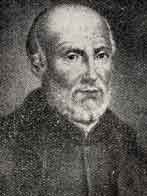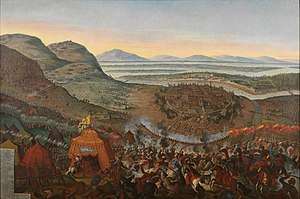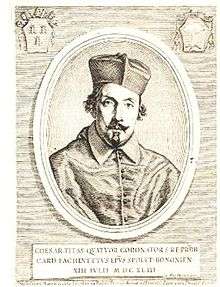1683
1683 (MDCLXXXIII) was a common year starting on Friday of the Gregorian calendar and a common year starting on Monday of the Julian calendar, the 1683rd year of the Common Era (CE) and Anno Domini (AD) designations, the 683rd year of the 2nd millennium, the 83rd year of the 17th century, and the 4th year of the 1680s decade. As of the start of 1683, the Gregorian calendar was 10 days ahead of the Julian calendar, which remained in localized use until 1923.
| Millennium: | 2nd millennium |
|---|---|
| Centuries: | |
| Decades: | |
| Years: |
| 1683 by topic |
|---|
| Arts and science |
| Leaders |
| Birth and death categories |
| Births – Deaths |
| Establishments and disestablishments categories |
| Establishments – Disestablishments |
| Works category |
|
| Gregorian calendar | 1683 MDCLXXXIII |
| Ab urbe condita | 2436 |
| Armenian calendar | 1132 ԹՎ ՌՃԼԲ |
| Assyrian calendar | 6433 |
| Balinese saka calendar | 1604–1605 |
| Bengali calendar | 1090 |
| Berber calendar | 2633 |
| English Regnal year | 34 Cha. 2 – 35 Cha. 2 |
| Buddhist calendar | 2227 |
| Burmese calendar | 1045 |
| Byzantine calendar | 7191–7192 |
| Chinese calendar | 壬戌年 (Water Dog) 4379 or 4319 — to — 癸亥年 (Water Pig) 4380 or 4320 |
| Coptic calendar | 1399–1400 |
| Discordian calendar | 2849 |
| Ethiopian calendar | 1675–1676 |
| Hebrew calendar | 5443–5444 |
| Hindu calendars | |
| - Vikram Samvat | 1739–1740 |
| - Shaka Samvat | 1604–1605 |
| - Kali Yuga | 4783–4784 |
| Holocene calendar | 11683 |
| Igbo calendar | 683–684 |
| Iranian calendar | 1061–1062 |
| Islamic calendar | 1094–1095 |
| Japanese calendar | Tenna 3 (天和3年) |
| Javanese calendar | 1605–1606 |
| Julian calendar | Gregorian minus 10 days |
| Korean calendar | 4016 |
| Minguo calendar | 229 before ROC 民前229年 |
| Nanakshahi calendar | 215 |
| Thai solar calendar | 2225–2226 |
| Tibetan calendar | 阳水狗年 (male Water-Dog) 1809 or 1428 or 656 — to — 阴水猪年 (female Water-Pig) 1810 or 1429 or 657 |
| Wikimedia Commons has media related to 1683. |
Events
January–June
- April 10 – Charles V, Duke of Lorraine is appointed commander of the Imperial Army (Holy Roman Empire).
- May 3 – Sultan Mehmed IV enters Belgrade.
- May 24 – The Ashmolean Museum opens in Oxford (England), as the world's first university museum.
- June 12 – The Rye House Plot to assassinate Charles II of England is discovered.[1]
July–December
- July 8 – Qing dynasty Chinese admiral Shi Lang leads 300 ships with 20,000 troops out of Tongshan, Fujian, and sails towards the Kingdom of Tungning, in modern-day Taiwan and Penghu, in order to quell the kingdom in the name of Qing.
- July 14 – A 140,000-man Ottoman force arrives at Vienna, and starts to besiege the city.
- July 16–17 – Battle of Penghu: Qing Chinese admiral Shi Lang defeats the naval forces of Zheng Keshuang decisively.
- September 5 – Qing Chinese admiral Shi Lang receives the formal surrender of Zheng Keshuang, ushering in the collapse of the Kingdom of Tungning, which is then incorporated into the Qing Empire.
- September 12 – Battle of Vienna: The Ottoman siege of the city is broken with the arrival of a force of 70,000 Poles, Austrians and Germans under Polish–Lithuanian king Jan III Sobieski, whose cavalry turns their flank (considered to be the turning point in the Ottoman Empire's fortunes).[2]
- October 3 – Shi Lang reaches Taiwan and occupies modern-day Kaohsiung.
- October 6 – Germantown, Philadelphia is founded as the first permanent German settlement in North America (in 1983 U.S. President Ronald Reagan declares a 300th Year Celebration, and in 1987, it becomes an annual holiday, German-American Day).
- October 9 (possible date) – Louis XIV of France makes a morganatic marriage with Madame de Maintenon in a secret ceremony following the death on July 30 of his queen consort, Maria Theresa of Spain.[3]
- November 1 – The English crown colony of New York is subdivided into 12 counties.
- December – The River Thames in England freezes, allowing a frost fair to be held.
Date unknown
- Wild boars are hunted to extinction in Britain.[1]
Births
- January 13 – Christoph Graupner, German composer (d. 1760)
- January 29 – Juan de Galavís, Spanish Catholic Archbishop of Santo Domingo, Bogotá (d. 1739)
- February 28 – René Antoine Ferchault de Réaumur, French scientist (d. 1757)
- March 1 – Caroline of Ansbach, British queen and regent, wife of George II of Great Britain (d. 1737)
- April 3 – Mark Catesby, English naturalist (d. 1749)
- June 23 – Étienne Fourmont, French orientalist (d. 1745)
- September 7 – Maria Anna of Austria, Archduchess of Austria and queen consort of Portugal (d. 1754)
- September 11 – Farrukhsiyar, Mughal Emperor (d. 1719)
- September 25 – Jean-Philippe Rameau, French composer (d. 1764)
- October 17 – Aixin-Jueluo Yuntang, born Aixin-Jueluo Yintang, Qing prince (d. 1726)
- October 25 – Charles FitzRoy, 2nd Duke of Grafton, British politician (d. 1757)
- November 10 – King George II of Great Britain (d. 1760)
- November 30 – Ludwig Andreas von Khevenhüller, Austrian field marshal (d. 1744)
- December 19 – King Philip V of Spain (d. 1746)
- December 27 – Conyers Middleton, English minister (d. 1750)
- date unknown
- Anna Maria Thelott, Swedish artist (d. 1710)
- Benedicta Margareta von Löwendal, German industrialist (d. 1776)
Deaths

Julien Maunoir
Alfonso VI of Portugal
- January 2 – Sir Thomas Twisden, 1st Baronet, English politician (b. 1602)
- January 14 – Edward Thurland, English politician (b. 1607)
- January 15 – Philip Warwick, English writer and politician (b. 1609)
- January 21 – Anthony Ashley Cooper, 1st Earl of Shaftesbury, British politician (b. 1621)
- January 28 – Julian Maunoir, French Jesuit priest (b. 1606)
- January 30 – Cesare Facchinetti, Italian Roman Catholic cardinal (b. 1608)
- February 18 – Nicolaes Pieterszoon Berchem, Dutch painter (b. 1620)
- February 27 – Engel de Ruyter, Dutch admiral (b. 1649)
- February 28 – Johann Paul Freiherr von Hocher, Austrian chancellor (b. 1616)
- March 6 – Guarino Guarini, Italian architect of the Piedmontese Baroque (b. 1624)
- March 8 – Robert Paston, 1st Earl of Yarmouth, English politician, earl (b. 1631)
- March 11 – Giovanni Bernardo Carboni, Italian painter (b. 1614)
- March 14 – Robert Montagu, 3rd Earl of Manchester, English politician (b. 1634)
- March 16 – Henrik Bjelke, Norwegian military officer (b. 1615)
- March 19 – Thomas Killigrew, English dramatist (b. 1612)
- April 28 – Daniel Casper von Lohenstein, German writer, diplomat and lawyer (b. 1635)
- March 29 – Yaoya Oshichi, young Japanese girl burned at the stake for arson (b. 1667)
- May 2 – Stjepan Gradić, Croatian philosopher and scientist (b. 1613)
- May 15 – John Ernest II, Duke of Saxe-Weimar (b. 1627)
- June 4 – Wolfgang George Frederick von Pfalz-Neuburg, German bishop (b. 1659)
- July 7 – Elisabeth Henriette of Hesse-Kassel, daughter of William VI (b. 1661)
- July 10 – François Eudes de Mézeray, French historian (b. 1610)
- July 13 – Arthur Capell, 1st Earl of Essex, English statesman (b. 1631)
- July 21 – William Russell, Lord Russell, English politician (b. 1639)
- July 26 – Jean Le Vacher, French Lazarist missionary and French consul (b. 1619)
- July 30 – Maria Theresa of Spain, French queen, married to Louis XIV of France (b. 1638)
- August 4 – Turhan Hatice Sultan, Ottoman Valide Sultan, married to Ibrahim and the mother of Sultan Mehmed IV (b. 1627)
- August 18 – Charles Hart, English actor (b. 1625)
- August 22 – Sir John Hobart, 3rd Baronet, English landowner and politician (b. 1628)
- August 24 – John Owen, English non-conformist theologian (b. 1616)
- September 6 – Jean-Baptiste Colbert, French minister of finance (b. 1619)
- September 12 – King Afonso VI of Portugal (b. 1643)
- September 17 – John Campanius, Swedish Lutheran minister in New Sweden (b. 1601)
- October 8 – Philipp Friedrich Böddecker, German organist and composer (b. 1607)
- October 9 – Francesco Caetani, 8th Duke of Sermoneta, Governor of the Duchy of Milan (b. 1613)
- October 25 – William Scroggs, lord chief justice of England (b. c. 1623)
- November 10
- John Collins, English mathematician (b. 1625)
- Robert Morison, Scottish botanist and taxonomist (b. 1620)
- November 16 – Margareta Huitfeldt, Norwegian-Swedish noble (b. 1608)
- November 29 – John Wright, British politician (b. 1615)
- December 7
- John Oldham, English poet (smallpox) (b. 1653)
- Algernon Sidney, English politician (b. 1623)
- December 13 – Anna Sophia II, Abbess of Quedlinburg, Abbesses of Quedlinburg (b. 1638)
- December 15 – Izaak Walton, English writer (b. 1593)
- December 16 – John Knight, Member of the Parliament of England (b. 1613)
- December 25 – Samuel Clarke, English writer and priest (b. 1599)
- December 27 – Maria Francisca of Savoy (b. 1646)
- date unknown
- Birgitta Durell, Swedish industrialist (b. 1616)
- Roger Williams, English theologian and colonist (b. 1603)
gollark: Since the prayer thing was occupying two CPU threads, a rough approximation says it's praying with about 10W (10 Joules per second).
gollark: Is prayer wholeheartedness transferred over some kind of out of band signalling or is it in-band like VT100?
gollark: There's not really a flag for that in yes.
gollark: How would I know?
gollark: God(s) obviously cannot not listen now.
References
- Everett, Jason M., ed. (2006). "1683". The People's Chronology. Thomson Gale.
- "Historical Events for Year 1683 | OnThisDay.com". Historyorb.com. Retrieved June 24, 2016.
- Buckley, Veronica (2008). Madame de Maintenon: The Secret Wife of Louis XIV. London: Bloomsbury. p. 276. ISBN 0-7475-8098-7.
This article is issued from Wikipedia. The text is licensed under Creative Commons - Attribution - Sharealike. Additional terms may apply for the media files.

.png)
